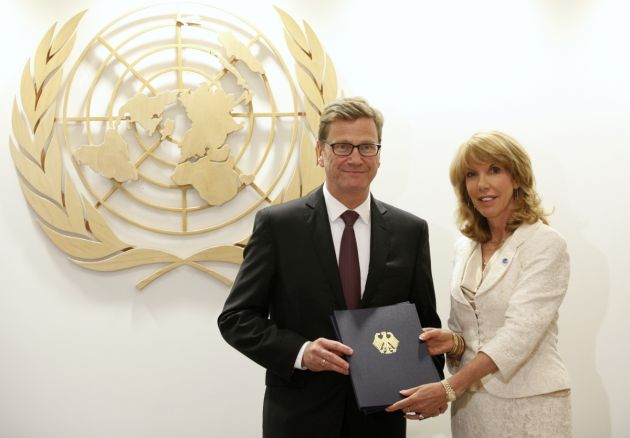Christian group uses video to urge US to sign Arms Trade Treaty

Almost 70 countries have signed the Arms Trade Treaty – a worldwide commitment to ending the illegal sale of weapons largely held responsible for arming the world's most violent conflicts.
Churches in many countries urged their leaders to do so in order to keep up the momentum from successful negotiations until the new treaty takes effect.
Signatories of the treaty include countries that export arms and States where imported arms fuel violence.
The Geneva-based World Council of Churches said in a statement Tuesday that the high turnout on the first day of signing mirrored broad support for controlling arms sales, which brought nearly 100 churches and related organizations into the WCC's two-year campaign for the treaty.
The 67 signatories included Japan, the UK and Mexico.
Yet perhaps the most notable country to not sign the treaty was the United States, the world's largest arms dealer.
While U.S. Secretary of State John Kerry pledged American support in curbing the multibillion-dollar arms trade, official support of the treaty must first be approved by the U.S. Senate.
But before the United States can sign the treaty, ratification must first be approved by its Senate, which, in March, passed an amendment to budget legislation preventing the U.S. from signing.
This has some U.S. Christians concerned.
Last week, the American Values Network, a Christian advocacy group focused on public policy, released a two-minute video as part of a campaign to pressure the U.S. to ratify the treaty.
Targeted at the faith and veteran communities in seven U.S. states whose senators oppose the treaty, the video depicts two young girls asking the U.S. not to join the "bad guys," North Korea, Iran and Syria in opposing the treaty.
In its debut weekend, the video racked up more than 500,000 views on YouTube.
"As the little girls say, there is a reason the bad guys are fighting the treaty and our churches, military, and all the good countries are supporting it," said Eric Sapp, AVN's executive director, in a press release.
The Arms Trade Treaty is the result of seven years of international negotiations, but treaty opponents in the U.S. believe it will infringe upon Americans' right to bear arms because it calls for a national database of information about gun owners.
The National Rifle Association has advocated strongly against the treaty. In December, NRA president David Keene called the treaty "problematic" and told Reuters President Obama would have a fight on his hands should he bring the treaty before the Senate for ratification.
But AVN's Sapp hopes his video will change some hearts in the Senate.
"Especially after the overwhelming response this video has received from faith voters and veterans in their states," he said, "We hope our senators will think twice before casting their lot with ... dictators."
"Sign early" was the message that ecumenical campaigners gave to 24 governments in recent days – 14 of them in Africa, the continent that has suffered most from unregulated arms sales.
Among the major arms exporters signing were Germany, the United Kingdom and France along with smaller exporters such as Norway and Sweden.
Russia, China, India and others abstained from the treaty vote and have not indicated if they will sign.
The human cost of illicit arms trading has been the focus of church advocacy for the arms treaty to as many as 47 countries when negotiations peaked earlier this year.
In April, 156 countries voted for the treaty, a milestone in bringing the multibillion-dollar arms exports under control.
The treaty was to take effect once 50 countries ratified it.
In the meantime, noted the WCC, without these new binding global controls, some 2,000 people will continue to die each day from armed violence.
When the treaty is in force and working, it will be more difficult to supply the arms that are fueling the ongoing bloody conflict in Syria. Until then it remains easier to sell bullets, bombs and deadly weapons than it is to sell bananas or pineapples.
The "Ecumenical Campaign for a Strong and Effective Arms Trade Treaty" developed out of a WCC Central Committee action in 2011.
A campaign network was formed in mid-2011 during the International Ecumenical Peace Convocation Churches in Kingston, Jamaica.
Churches and church ministries in 40 countries joined the campaign.
Uganda, DR Congo, Nigeria, Sierra Leone, Brazil, Mexico, Canada, Sweden, Germany, Norway, India, South Korea, Australia and Papua New Guinea were some of the countries involved. There was close collaboration with Roman Catholic and Evangelical groups.
African churches and governments played a key role in the campaign. Countries heavily affected by decades of irresponsible arms sales stood together and made their voices heard.
A key demand was that the treaty must include small arms and light weapons, plus ammunition, or it was not the treaty that Africa needed.